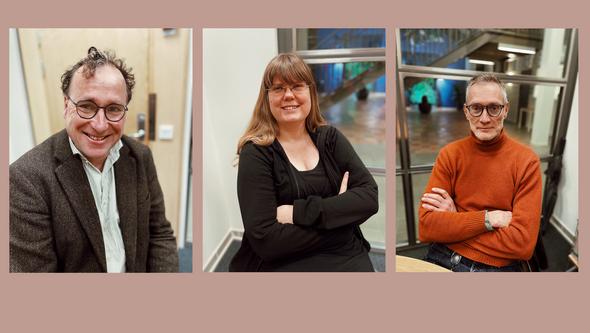
- Home
- Research
- Find research
- Researching what few understand
Researching what few understand
The idea that mathematics gets easier the more you do it is a fallacy, according to Elizabeth Wulcan. Being a mathematician is in fact more about constantly questioning one’s own ability to understand.
“It’s part of doing maths. Mathematicians have to be very tolerant of feeling stupid, because otherwise they would get nowhere.”
We have gathered together to discuss what it is really like to do research in an area which, for the uninitiated, may seem quite opaque. Elizabeth Wulcan is an assistant professor of mathematics and does research on complex analysis. What drives her is trying to understand how things are connected, and not necessarily the applications for her research.
“It’s part of human intellectual activity to conduct basic research in order to find out how everything hangs together.
DICK KASPEROWSKI IS a professor in theory of science and one of the areas in which he conducts research is open science. He studies where in the research process you can include non-researchers and citizen science – when the public contribute data to research.
The third person at the table is Bernhard Mehlig. He is a professor of physics and works with complex systems; more specifically how particles move in turbulent flows. He and his colleagues use advanced mathematics to study these systems, but also collaborate with experimentalists. Bernhard Mehlig compares complex mathematics with assembling a bicycle.
“You have to know all the details and this requires some experience, but if you know how, it’s much easier. What is most difficult are the logical arguments that lead to the questions. Trying to find a sound hypothesis.”
RESEARCH IS LARGELY about setting up hypotheses and then testing them. The well-known scientific theorist Karl Popper claimed back in the 1930s that no hypothesis is definitively verifiable, but on the other hand everything is falsifiable.
“Research therefore has an inherent uncertainty, but that is also essential for progress. Science is in constant motion,” says Dick Kasperowski and continues:
“Popper had an ideal of the researcher as a person who is passionate about constantly questioning themself. One might wonder how realistic this actually is. Moreover, research is not something that is done entirely alone. It is a social activity in which the tasks can be very distributed and where it is perhaps difficult for all involved to see the big picture, and so it requires a high degree of trust between the researchers involved.”
BUT THE OTHER TWO at the table nod in agreement when the idea of constantly questioning oneself comes up.
“That’s exactly what it’s like,” says Bernhard Mehlig, and Elizabeth Wulcan adds:
“My friends often ask me to stop saying that I don’t know things, because I question myself all the time. I don’t know whether it’s an occupational hazard, or whether I was born that way.”
“It’s essential to question oneself, it can’t be otherwise. We are constantly checking for errors in our own models and calculations, and it is certainly depressing when we find something that isn’t right. Because then we have to do dig some more. It’s one of my most important tasks, showing the doctoral students that this is what you have to do,” says Bernhard Mehlig.

DEMANDS ON RESEARCHERS to be able to explain their research to people outside their own fields are growing. Research funders now require a popular science explanation in connection with research funding applications for example, and according to Sweden’s Higher Education Ordinance, universities have an obligation to engage in what are called third stream activities, in addition to teaching and research. However, although the three researchers around the table are very much in agreement on the need for communicating research, it is not an easy task. What do you communicate, and how?
“Not every single scientific journal article is going to be particularly relevant to the public. But trying to explain to people what I am doing and why? I absolutely love doing that,” says Bernhard Mehlig.
Elizabeth Wulcan points out that the difficulties for a mathematician are making their research comprehensible when there just aren’t any examples from everyday life that they can use.
“The objects I study are often not familiar to the uninitiated, and I have to give a simplified picture of what I do,” she says.
ONE QUESTION THAT the researchers return to many times is the uncertainty in research results, and how this ought to be communicated. Because although researchers constantly test their own hypotheses and feel uncertain about their results, this doesn’t equate to everything being questionable. Dick Kasperowski returns to Karl Popper and his way of looking at science – that we should question the results, but not the system itself.
“Problems arise when people think that they can have opinions about everything, without taking into account what science has arrived at,” says Bernhard Mehlig.
In light of COVID-19 and the debate about fake news, researchers believe that it is even more important to communicate about how research is actually done.
“Something that should be explained is what it actually means when a researcher says they ‘don’t know’. Because of course nobody can say anything with absolute certainty,” says Elizabeth Wulcan.
By: Camilla Persson